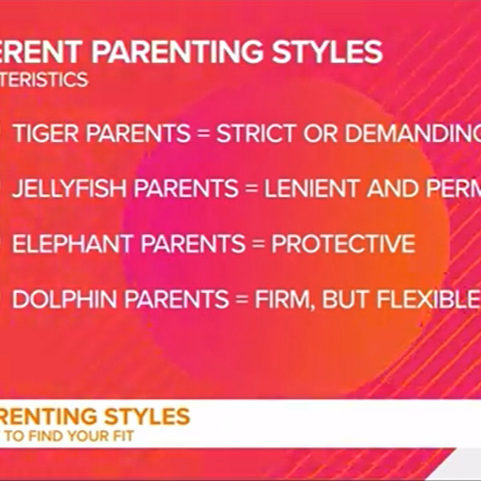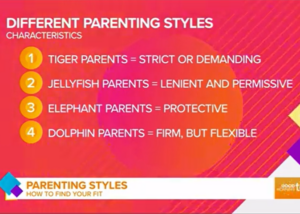
Understanding Parenting Styles: Finding the Balance Between Control and Empowerment
 Parenting can sometimes feel like navigating a jungle, with each day bringing unique challenges that require flexibility, patience, and resilience. Here are four distinct parenting styles inspired by animals: Tiger, Elephant, Jellyfish, and Dolphin. Each style reflects a unique approach to setting boundaries, providing guidance, and fostering children’s independence.
Parenting can sometimes feel like navigating a jungle, with each day bringing unique challenges that require flexibility, patience, and resilience. Here are four distinct parenting styles inspired by animals: Tiger, Elephant, Jellyfish, and Dolphin. Each style reflects a unique approach to setting boundaries, providing guidance, and fostering children’s independence.
- Tiger Parenting: The Authoritative Path
Tiger parenting is characterized by a high degree of control and strict expectations. Parents using this style often set firm rules and have clear expectations for their children’s behavior and achievements. Tiger parents are focused, protective, and committed to instilling discipline. While effective in providing structure, this approach can become rigid if not balanced with warmth and responsiveness.
- Elephant Parenting: The Gentle Protector
Elephant parents share similarities with Tiger parents in terms of protection, but with a softer approach. They are nurturing and prioritize their child’s emotional security. "Elephant parents may be more gentle, but can also sometimes become overly protective,” says Dr. Schwall. This style offers children emotional support but can limit opportunities for independence if boundaries aren’t clearly defined.
- Jellyfish Parenting: The Laid-Back Approach
Jellyfish parents take a laissez-faire approach, often providing minimal structure or guidance. This style emphasizes freedom and independence, with few rules or expectations. However, Dr. Schwall notes, “Without boundaries, children may struggle to find stability and clear expectations, making it difficult for them to navigate social and academic challenges effectively.”
- Dolphin Parenting: The Balanced Communicator
Dolphin parenting strikes a balance between authority and flexibility. Dolphin parents establish clear expectations but allow room for open communication, encouraging children to express themselves while adhering to boundaries. “This style is collaborative and fosters mutual respect,” says Dr. Schwall, adding that it combines playfulness with guidance, helping children learn problem-solving skills and self-discipline.
Flexibility is Key in Parenting
Dr. Schwall emphasizes that no parenting style is “one-size-fits-all” and that each child’s unique temperament, learning needs, and developmental stage should guide parenting choices. He explains, “Effective parenting takes flexibility, which involves adapting our approach to meet our child’s individual needs without compromising on key values like respect, empathy, and responsibility.”
For example, an approach that works well with one child may not resonate with another. Dr. Schwall encourages parents to learn and grow by exploring different strategies, observing their children, and adapting their approach as needed. "Research and awareness are vital," he says, noting that parents benefit from having a support network and access to educational resources.
The Role of Childhood Experiences
A parent’s own upbringing heavily influences their parenting style, whether consciously or subconsciously. Dr. Schwall highlights that many parents attempt to either replicate or avoid the approaches they experienced growing up. "We often emulate what was modeled for us as children," he explains, urging parents to develop self-awareness to recognize these patterns and consider what’s most effective for their own family.
Support and Resources for Parents
Parenting is a complex journey that can benefit greatly from community support. Dr. Schwall and the Center for Integrative Counseling and Psychology provide resources, parenting talks, and outreach programs to help parents develop confidence and adaptability. “Parenting is tough,” he says, “and parents need support—but they also need to recognize the strengths they bring to the role.”
The Center offers resources, articles, and community programs aimed at empowering parents to raise confident, well-adjusted children.
Whether you lean toward Tiger, Elephant, Jellyfish, or Dolphin parenting, the goal is to find a balance that works for your child, fosters a positive relationship, and promotes healthy development. Dr. Schwall’s insights remind us that parenting styles are adaptable, and a strong, supportive community can be a valuable asset in navigating the journey.
